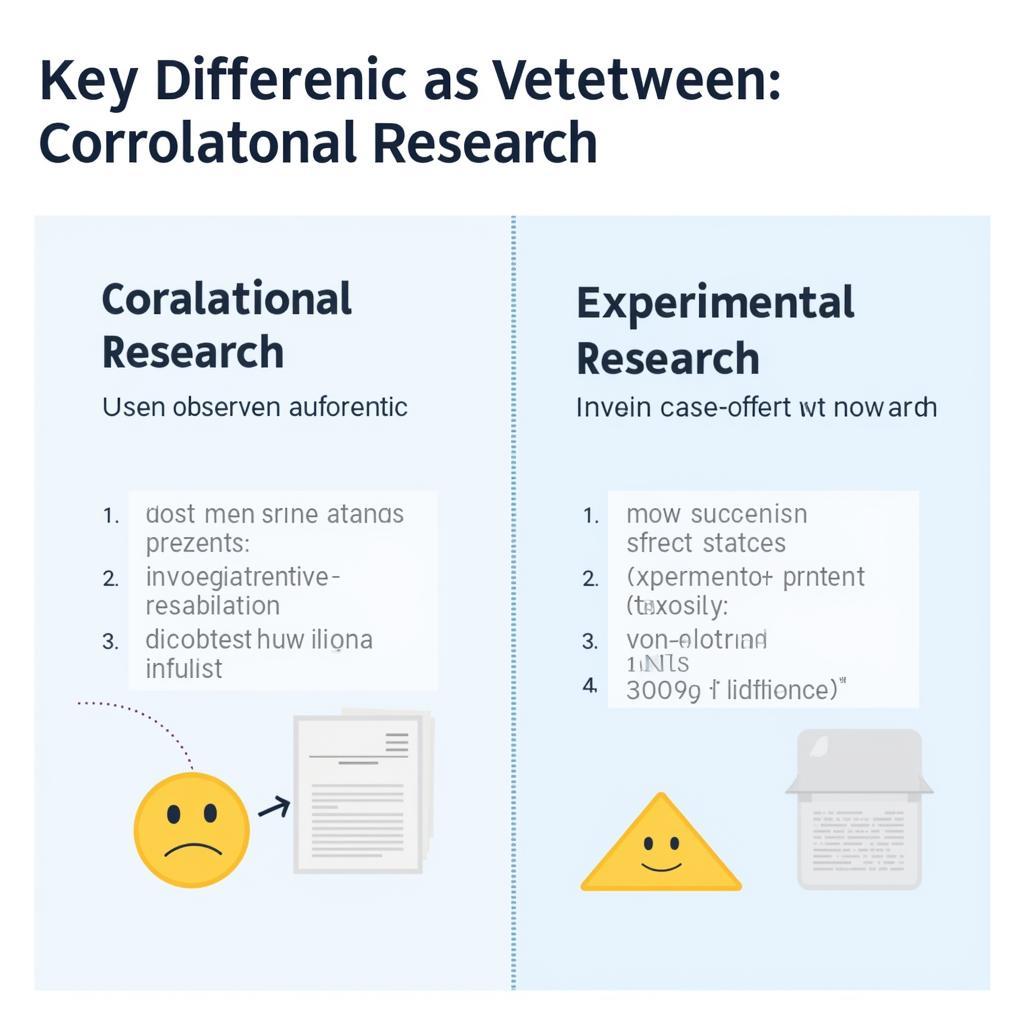When it comes to unraveling the mysteries of the world, both correlational and experimental research play crucial roles. However, these research approaches differ significantly in their methods and the types of conclusions they allow us to draw. Understanding these differences is essential for anyone interested in scientific inquiry, especially in the realm of paranormal research, where separating fact from fiction is paramount.
Examining Relationships vs. Establishing Cause and Effect
Correlational research, at its core, examines the relationship between two or more variables. For instance, we might observe a correlation between the phases of the moon and the frequency of reported paranormal experiences. This means that as one variable changes, the other tends to change as well. However, it’s crucial to remember that correlation does not equal causation.
On the other hand, experimental research aims to establish cause-and-effect relationships. In this approach, researchers manipulate an independent variable and observe its impact on a dependent variable, while controlling for other factors that could influence the outcome. This level of control is what sets experimental research apart and allows for stronger conclusions about causality.
 Correlational vs. Experimental Research
Correlational vs. Experimental Research
Delving Deeper into Correlational Research
Correlational research is particularly useful when studying phenomena that cannot be ethically or practically manipulated in a lab setting. Imagine, for example, trying to study the effects of witnessing a traumatic paranormal event on individuals’ mental health. It would be unethical to subject participants to such an experience. Instead, researchers might use correlational research to investigate whether individuals who have witnessed such events report higher levels of anxiety or PTSD symptoms.
While correlational research cannot prove causation, it can help us identify potential relationships that warrant further investigation. It can also be used to make predictions about future behavior or events.
The Power of Experimental Research
Experimental research is the gold standard for determining cause-and-effect relationships. By manipulating variables in a controlled environment, researchers can isolate the effects of the independent variable on the dependent variable and rule out alternative explanations.
Let’s say researchers want to study the impact of electromagnetic fields (EMFs) on people’s perception of paranormal activity. They could conduct an experiment where one group of participants is exposed to high levels of EMFs while another group (the control group) is exposed to normal levels. If the group exposed to high EMFs reports significantly more paranormal experiences, it would provide evidence supporting the hypothesis that EMFs influence such perceptions.
Choosing the Right Approach for Paranormal Research
Both correlational and experimental research have their limitations. Correlational research can be influenced by confounding variables, making it difficult to determine the true nature of the relationship between variables. Experimental research, while powerful, can be artificial and may not always reflect real-world situations.
Ultimately, the best research approach depends on the specific question being asked and the resources available. For many areas of Paranormal Research, a combination of correlational and experimental studies is often necessary to gain a more complete understanding of the phenomenon in question.
Conclusion
While both correlational and experimental research contribute to our understanding of the unknown, recognizing their differences is crucial for interpreting research findings accurately. As we continue to explore the mysteries of the paranormal, employing rigorous research methods and critical thinking will be essential for separating genuine phenomena from mere illusions.
FAQs
1. Can correlational research ever prove causation?
No, correlational research can only demonstrate a relationship between variables, not a cause-and-effect relationship.
2. What is a confounding variable?
A confounding variable is an extraneous factor that influences both the independent and dependent variables, making it appear as though there is a direct relationship between them when there may not be.
3. What are some examples of experimental research in psychology?
Studies investigating the effectiveness of different therapies, the impact of stress on cognitive performance, and the influence of social media on mood are all examples of experimental research in psychology.
4. What is a control group in experimental research?
A control group is a group of participants who do not receive the experimental treatment or intervention. Their purpose is to provide a baseline for comparison with the experimental group.
5. Why is it important to use a control group in experimental research?
A control group helps researchers isolate the effects of the independent variable and rule out alternative explanations for the observed results.
Exploring Further
For those eager to delve deeper into the world of research methods, our website offers a wealth of resources:
-
What are the major steps to quantitative research design? This comprehensive guide breaks down the essential steps involved in designing and conducting quantitative research studies.
-
Experimental research topics psychology. Discover a range of fascinating experimental research topics within the field of psychology.
-
Need a refresher on research methods? Check out our research methods in psychology textbook.
-
Want to stay ahead of the curve? Explore the latest advancements in research methods with Methods in behavioral research 13th edition.
-
Which of the following research designs will allow cause-and-effect conclusions? Test your knowledge and understanding of different research designs.
We encourage you to continue your journey of discovery and exploration. Should you have any questions or require further assistance, please do not hesitate to contact our team.
Contact us 24/7:
Phone: 0904826292
Email: research@gmail.com
Address: No. 31, Alley 142/7, P. Phú Viên, Bồ Đề, Long Biên, Hà Nội, Việt Nam.